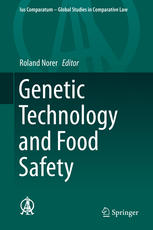

Most ebook files are in PDF format, so you can easily read them using various software such as Foxit Reader or directly on the Google Chrome browser.
Some ebook files are released by publishers in other formats such as .awz, .mobi, .epub, .fb2, etc. You may need to install specific software to read these formats on mobile/PC, such as Calibre.
Please read the tutorial at this link: https://ebookbell.com/faq
We offer FREE conversion to the popular formats you request; however, this may take some time. Therefore, right after payment, please email us, and we will try to provide the service as quickly as possible.
For some exceptional file formats or broken links (if any), please refrain from opening any disputes. Instead, email us first, and we will try to assist within a maximum of 6 hours.
EbookBell Team

4.7
26 reviewsThe volume gives an overview on how legislators all over the world have come up with different legal solutions for governing genetically modified organisms (GMOs) and food security and provides a compact summary of the existing regulations in this field. In a comparative legal approach, a general report analyses and compares these various national and supranational legal systems. It closely follows the newest developments at the interface between genetic engineering law and food law.
The emergence of a new technology usually leads to fundamental questions as to how the law should respond to it. The regulation of genetically modified organisms is a prime example, they have been discussed controversially ever since they were subject of legislation and regulation. In particular, this applies to the use of GMOs in food production. There is a variety of interesting legislations and a differentiated width of legal frameworks on international, supranational (EU) and national level to be found. The different regulations that thereby came to light are evidence of the various opinions and policies the societies and states have developed on this matter. It is this variety of regulations the volume examines, primarily on the basis of national reports that were handed in concerning the topic of genetic technology and food security at the occasion of the XIX International Congress of Comparative Law.